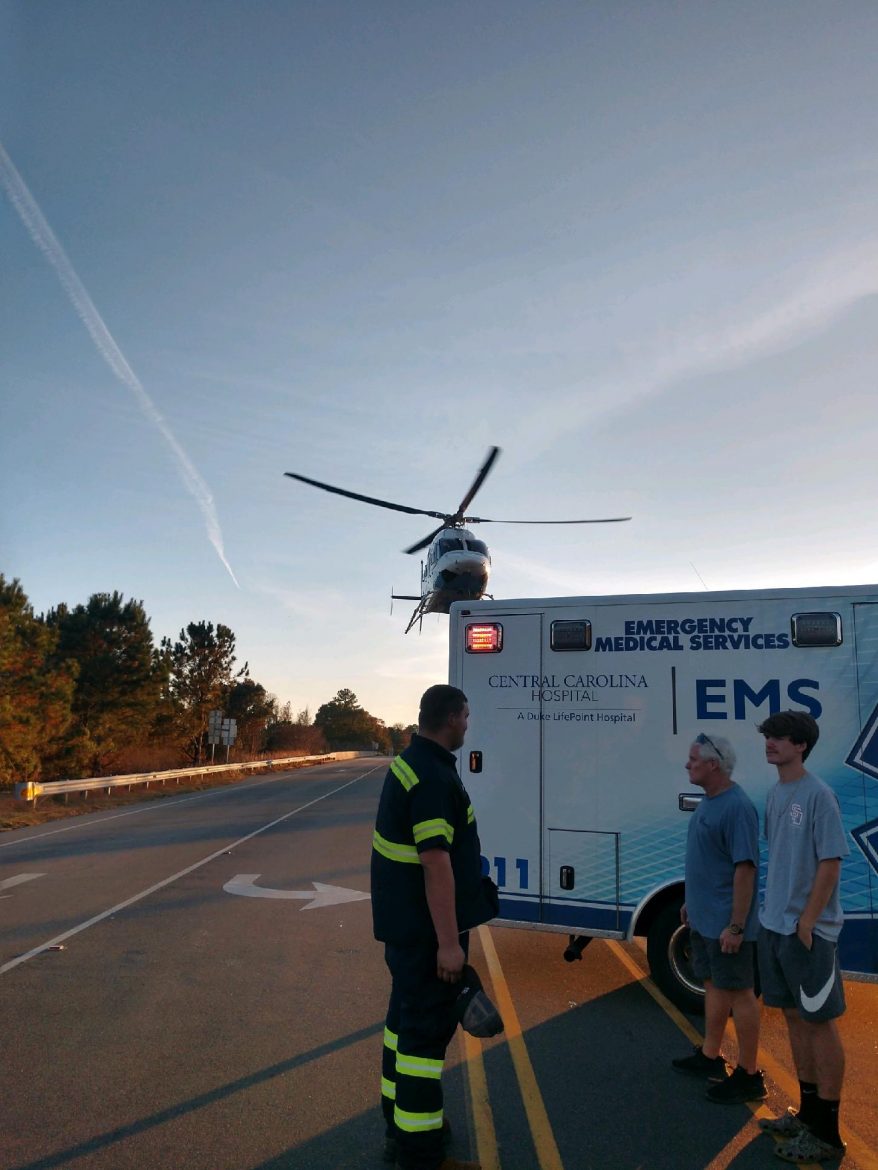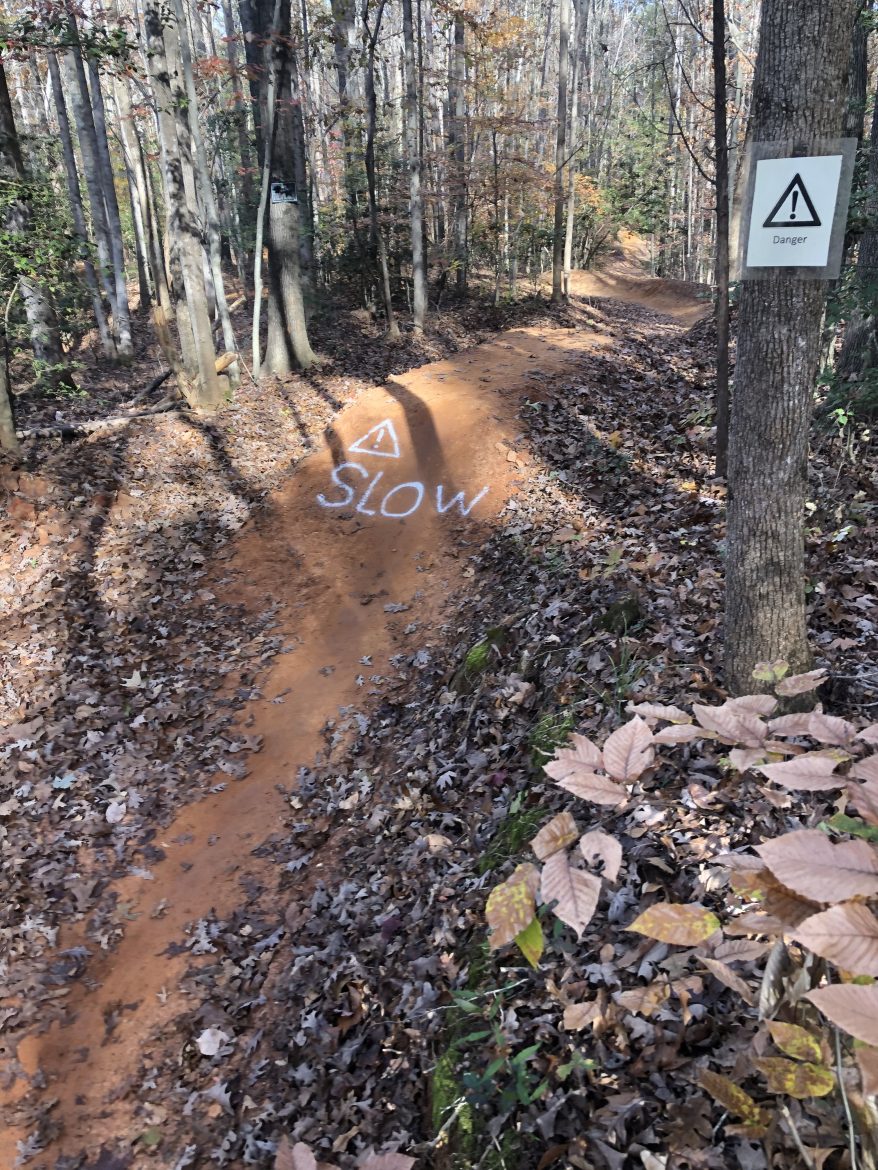
A county manager in Lee County, North Carolina has closed the San-Lee Gravity Bike Park in the town of Sanford due to multiple injuries. The county said in a statement that they expect the park to “remain closed for the foreseeable future as trail modifications are made to enhance and improve the safety of bike riders.”
The closure is a result of what the county calls a “serious injury” that occurred on a recent weekend, which is the 7th injury on the same jump in the past year, “prompting the temporary closure to review trail safety measures and maintenance needs.”
San-Lee Park is Lee County’s largest owned park property and was established to preserve natural space and provide community access to nature. Outside of mountain biking, visitors can hike, boat, fish, and camp. The first bike trail was built about 20 years ago by volunteers and local riders, and the 9.5-mile trail wraps around the park, while the Gravity Park trails dash in between the circumference.
Volunteers started shaping berms and bigger jumps about six or seven years ago. The earlier trails were more moderate, with advanced trails growing more recently, featuring doubles and tabletops.
“And from a liability standpoint, the county is concerned about what’s happening in the number of injuries and accidents that have occurred over the last 12 months,” County Manager John Crumpton told Singletracks in an interview. The injuries have included broken ribs and fingers, concussions, and back injuries, some of which have required an airlifted medical evacuation. “And the last accident involved a 12-year-old and we kind of said time out. We need to do an evaluation and find out what’s going on.” Crumpton says they don’t want to close the trails, but that’s what the “time out” means as of now.
Aside from injuries on jump trails, the county’s statement noted a few other discrepancies with the park.
“Trails were also intended to blend into the natural environment but some trail modifications and features do the opposite and disrupt the natural scenery and wildlife habitats of the park. These are concerns that must be addressed.” The county says that they want to maintain a system of trails that meet reasonable expectations for the public when it comes to safety and difficulty, and would like trails that blend into the environment.
So, to ensure that these requirements are met, the county’s parks and recreation department is assuming responsibility for review, approval, and supervision of all trail modification and expansion work, and will now directly supervise all on-site volunteers. Lee County will also develop what they’re calling a “bike trail safety committee” made up of local mountain bikers and county staff. The committee plans to inspect trails on a monthly basis, review data on accidents and injuries, and report and make recommendations to the county manager.
“So, how does the county go in and reduce that risk?” says Crumpton. “We’re meeting with folks that design trails in other areas with the specific goal of not closing the trails, but making them safer so that we don’t have these types of crashes.”
According to the county, the park might get around 150 riders over a holiday weekend, and roughly half of that on a regular weekend. Since they’ve closed the Gravity Bike Park, which sits inside the looping San-Lee trail, they’re probably getting around 50 riders in a weekend. With several hundred riders visiting the park a month, the incidence of injury is low, but the severity is what concerns Crumpton.
The San-Lee trail is one of a few mountain bike trails in and near Sanford, North Carolina which is a few hours east of the booming mountain bike scene around Asheville. Crumpton knows that mountain biking has grown over the pandemic and understands that the trails at San-Lee can be an economic driver.
“I think we’ve committed to the trails by allowing them to be built in the first place, so I don’t think we should just go in there and eliminate them. I think we should go in there and make them better.”
That might mean speaking with other North Carolina mountain bike communities and trail builders or consultants. Crumpton says though, that the county has had a very informal relationship with the local mountain bike community and supposedly, since the lack of any involvement has led to these accidents, they will now have full involvement.
“We are micromanaging them to make sure everybody understands the expectations.” Crumpton sees this as protecting taxpayers from potential lawsuits that hold the city liable. They plan to review and implement official signage to put more liability in riders’ hands, but jumps and trails have a high possibility of being downgraded, reshaped, and even removed.
Donn Otte, a builder in his 60s who has developed most of the gravity park for over the past ten years with a few other dedicated volunteers says the problems can be fixed easily and are a result of inexperienced riders birthed from the pandemic, who haven’t paid attention to the countless signs he’s fixed on trees, posts, and jumps throughout the entire park. The accidents have occurred on the Shock and Awe trail, not the expert level Insanity trail with gaping doubles.
“There’s more signs on this bike park than any trail I’ve ever been to. All signs that I’ve put up.” Otte has painted warnings across takeoffs, plastered signs about the possibility of costly medical evacuations, and more. The result of the crashes, he says, is riders carrying too much speed into a jump and overshooting the landing.
His solution, if the county allows him to resume the work there that he’s been doing since San-Lee bike park’s creation, is to start the line earlier, and reduce the available speed for riders. That all depends on when the county allows Otte and other volunteers back into the park. Otte says that multiple county employees have gone out to the park to examine the jumps since the accident over Easter weekend. As of Wednesday, when Otte met with the county, he’s heard the park may stay closed until June after the county has a professional consultant review the network, verify trail work, and change the signage.
When Otte started building the gravity park years ago, Lee County was aware and admittedly hasn’t cared, until now. Otte and his crew were inspired by another trail network they rode in the state, and thought they could bring trails like that to Sanford. The rented a mini-excavator and paid $100 a day out of their own pockets. Eventually, Otte decided it would be better just to buy one. “I fell in love with running a mini-ex,” he says.

Otte and the other volunteers called themselves Sanford Area Mountain Bike Association at first, but as far as being an official organization they are completely grassroots, with bigger MTB clubs like SORBA and TORC nearby. Otte estimates he’s spent probably $20,000 from his own pocket on the Gravity Park trails. The hours and valuation of the work would likely be in the hundreds of thousands of dollars, but it’s resulted in a network with trails and features that can be ridden by 6-year-olds learning their way around dirt, expert riders, and anyone in between. The skills area, he’s dubbed Life Alert. “I’ve fallen and I can’t get up,” he says laughing. The skills park has a pump track and kid-friendly features.
Modifying the advanced trails because not everyone can ride them doesn’t make sense to Otte, because there is already a wide variety of trails for every skill level at the park.
As for Lee County’s statement on the trails not blending in with nature, Otte says “That’s bullshit.” The park sits next to an interstate with cars buzzing close by. “No one’s going to go up there to hike and have a nature experience with the roar of the cars.”
Otte is concerned that the county doesn’t understand mountain biking and that will have an impact on the outcome. The trails bring people from all over the state to ride, but at the same time, the Sanford economy is largely based on manufacturing.

More and more cities across the United States have built publicly-accessible bike parks on city, county, and state property. Valmont Bike Park in Boulder, Colorado is a 42-acre city park with trails suitable for first time and expert riders, as is Ruby Hill Bike Park in Denver. In 2020, Singletracks visited the South Trail network in Marquette, Michigan, a public bike park with easy-rolling beginner trails, and massive jumps and wooden drops for experienced riders. The messages at these public bike parks are clear: ride at your own risk. Marquette knows that people visit the town just to ride their trails and aggressively markets the parks and trail systems.
Lee County seems to be on board with the park, but Otte isn’t sure how much of his work they’ll transform. In a meeting on Wednesday, he said he presented a plan with county officials, but said the county wants to put a backhoe in the park for trail maintenance, and keep Otte’s mini-excavator out. He thinks that would be a “big waste of money.”
In the meantime, Otte, his volunteers, and the local riding community will be on standby. By June, they’ll have lost the best of their riding season, before the hot and humid North Carolina summer starts.









Fortunately it seems like there should be an easy fix or two to make things safer. I haven’t been to San-Lee in many years but now I want to go back!
A place I went to a few weeks back, though really nice flow trail had no berms, jumps, or features. I asked one of the members of the local mtb club who maintains it about it – he said the coal company which owns the property said that was a no-go for liability. They also banned the usage of signage on the main highway directing bikers to the trail system.
I wasn’t shocked. These full suspension bikes make noobs think they are BKXC morphed with Seth BikeHacks and are way… way… out of their league. LOL
I mean Seth does have injuries that prevent him from riding for months every few years, so in some ways these new riders are just like him!
This is why I moved out west where people are responsible for their own safety, not the government. So sad, North Carolina has amazing trails but regulation will spoil all the fun and drive tourists away. Y’all come out to Utah, you can do whatever you want as long as you have a credit card!
No, don’t come to Utah. Stay where you are.
This is such utter rubbish. San Lee was awesome! Now it will struggle to attract mtb’ers. The same thing is happening to all of the trails around here. Advanced riders may as well move away or sell their bikes for a huffy. F*** the pencil pushers
Yeah, those three pictures showing all the warning devices and traffic cones? Meets this to a t:
“Trails were also intended to blend into the natural environment but some trail modifications and features do the opposite and disrupt the natural scenery and wildlife habitats of the park. These are concerns that must be addressed.”
Cones and numerous orange/white signs aren’t very nature-y.
Yes, I believe one should be responsible for their own well being when doing activities like this. I also believe in too much of a good thing, or pushing things too far. Hopefully the trails don’t close.
“Result of inexperienced riders birthed from the pandemic”, end of story…